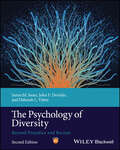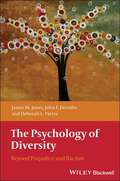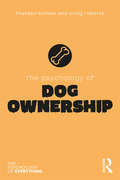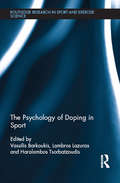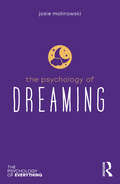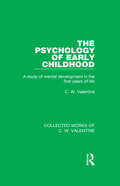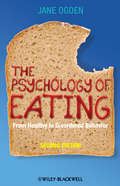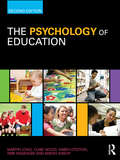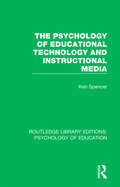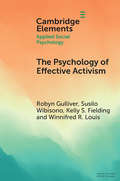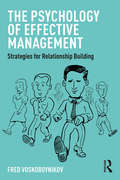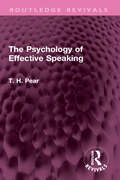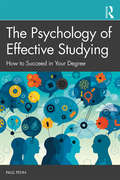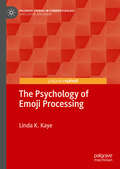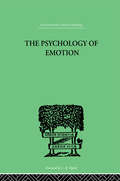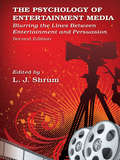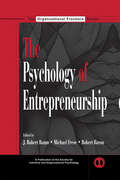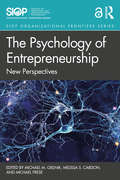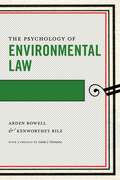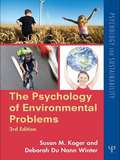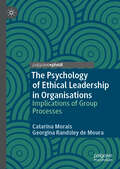- Table View
- List View
The Psychology of Diversity: Beyond Prejudice and Racism
by James M. Jones Deborah L. Vietze John F. DovidioExamines the barriers and benefits of diversity, offering a comprehensive framework for addressing systemic inequities and enhancing intergroup relations The Psychology of Diversity: Beyond Prejudice and Racism provides a thorough exploration of how diversity influences individual and societal behavior. Now in its second edition, this fully revised textbook addresses the evolving challenges and opportunities of diversity in a world shaped by rapid demographic shifts, rising polarization, and the intensifying need for equity and inclusion. Integrating rigorous research, historical context, and actionable insights, the authors illuminate how understanding and embracing diversity can foster stronger communities and institutions. Updated and expanded content responds to the evolving challenges of the past decade, such as rising political polarization, increasing resistance to equity initiatives, and the escalating diversity divide, while highlighting new opportunities for inclusion and mutual understanding. Entirely new chapters address health disparities, racial bias in policing, debates over affirmative action and Critical Race Theory, the historical and systemic roots of diversity challenges, and other contemporary issues. Featuring timely coverage of diversity's complexities in the face of unprecedented societal changes, Psychology of Diversity: Beyond Prejudice and Racism: Explores diversity through psychological, historical, cultural, and institutional lenses while highlighting its broader societal impacts Provides evidence-based strategies and best practices for fostering inclusion, reducing bias, and building stronger intergroup relations Incorporates empirical research and case studies reflecting the latest findings in psychology, sociology, and neuroscience Contains new content on gender diversity, nonbinary identities, sexual orientation, and immigration as key diversity challenges and opportunities Integrates practical scenarios to illustrate key concepts and their application in everyday life Includes a wealth of teaching and learning tools and an online instructor's manual to support both independent study and classroom use The Psychology of Diversity: Beyond Prejudice and Racism, Second Edition, is an excellent textbook for advanced undergraduate and graduate courses on social psychology, prejudice, intergroup relations, and multiculturalism. It is also a valuable reference for professionals working to address equity challenges in fields such as education, healthcare, public policy, and organizational leadership.
The Psychology of Diversity: Beyond Prejudice and Racism (Coursesmart Ser.)
by James M. Jones Deborah L. Vietze John F. DovidioThe Psychology of Diversity presents a captivating social-psychological study of diversity, the obstacles confronting it, and the benefits it provides. Goes beyond prejudice and discrimination to discuss the personal and social implications of diversity for both majority and minority group members Considers how historical, political, economic, and societal factors shape the way people think about and respond to diversity Explains why discrimination leads to bias at all levels in society – interpersonal, institutional, cultural, and social Describes proven techniques for improving intergroup relations Examines the brain's impact on bias in clear terms for students with little or no background in neuroscience Includes helpful study tools throughout the text as well as an online instructor’s manual
The Psychology of Dog Ownership (The Psychology of Everything)
by Craig Roberts Theresa BarlowWhat are the benefits of owning a dog on health and well-being? Why does a problem dog behave as it does and how can owners deal with unwanted behaviour? How do dogs communicate with humans and each other? The Psychology of Dog Ownership explores the nature of our unique relationship with dogs and its effect on our mental and physical welfare. The book uses psychological learning theory to examine dog behaviour and highlights the importance of determining between typical dog behaviour and behaviour disorders that need treatment. Focusing on how dog owners can communicate effectively with their pets, and always with the dogsbest interests in mind, The Psychology of Dog Ownership enhances our understanding of the modern human-canine bond and shows how important and enjoyable this relationship can be.
The Psychology of Doping in Sport (Routledge Research in Sport and Exercise Science)
by Vassilis Barkoukis Lambros Lazuras Haralambos TsorbatzoudisThis is the first book to draw together cutting-edge research on the psychological processes underlying doping use in sport and exercise, thereby filling an important gap in our understanding of this centrally important issue in contemporary sport. Covering diverse areas of psychology such as social cognition, automatic and controlled processes, moral decision-making, and societal and contextual influence on behaviour, the book also explores methodological considerations surrounding doping assessment in psychological research as well as future directions for evidence-based preventive interventions and anti-doping education. Written by a team of leading international researchers from countries including the US, Canada, Australia, the UK, Greece, Germany, Italy, Denmark and Ireland, the book integrates empirical findings with theoretical guidance for future psychological research on doping, and illuminates the challenges, needs and priorities in contemporary doping prevention. It is important reading for advanced students and researchers in sport and exercise science, sport management and sport policy, and will open up new perspectives for professional coaches, sports administrators, policy makers and sport medicine specialists looking to better understand the doping behaviours of athletes in sport.
The Psychology of Dreaming (The Psychology of Everything)
by Josie MalinowskiWhy do we dream? What is the connection between our dreams and our mental health? Can we teach ourselves to have lucid dreams? The Psychology of Dreaming delves into the last 100 years of dream research to provide a thought-provoking introduction to what happens in our minds when we sleep. It looks at the role that dreaming plays in memory, problem-solving, and processing emotions, examines how trauma affects dreaming, and explores how we can use our dreams to understand ourselves better. Exploring extraordinary experiences like lucid dreaming, precognitive dreams, and sleep paralysis nightmares, alongside cutting-edge questions like whether it will ever be possible for androids to dream, The Psychology of Dreaming reveals some of the most fascinating aspects of our dreaming world.
The Psychology of Driving (The\psychology Of Everything Ser.)
by Graham J. HoleRoad accidents are the major cause of death and injury among young people in the developing world, and the field of psychology can offer great insights into the many factors that are at play when we get behind the wheels of our cars. Based on data collected around the world on drivers of all age groups, Graham Hole provides an up to date picture of the realities of driving, including visual perception issues, cell phone distractions, fatigue, drugs, and the effects of aging. These insights can help explain why we crash, as well as how we achieve the amazing feat of not crashing more often than we do. In this jargon-free and very accessible book, Hole applies psychological methods and insights to this every-day experience with two audiences in mind. First, he speaks to accident investigators, who frequently rely on well-developed understandings of engineering and forensics and less insight into the psychology of the driver. Second, of course, this book will be of value to anyone interested in the application of cognitive psychology to real-world behaviors, and to anyone who drives.
The Psychology of Early Childhood: A Study of Mental Development in the First Years of Life (Collected Works of C.W. Valentine)
by C.W. ValentineOriginally published in 1942, this title attempted to trace, from their very earliest appearances after birth, all aspects of mental development in childhood up to the age of about 4 or 5. It is based largely on the author’s almost daily observations of his own five children, over a period of some twenty years, supplemented by numerous tests and experiments. The first purpose of this book was to advance our knowledge of the psychology of childhood. The importance of such knowledge had become increasingly recognised. Even if not all is completely determined in the first 4-5 years, there was little doubt by this time that these first years are of profound significance for future development: and the better understanding and training of the young child may be at the root of many of our educational and social problems.
The Psychology of Eating
by Jane OgdenWith its primary focus on the psychology of eating from a social, health, and clinical perspective, the second edition of The Psychology of Eating: From Healthy to Disordered Behavior presents an overview of the latest research into a wide range of eating-related behaviors Features the most up-to-date research relating to eating behavior Integrates psychological knowledge with several other disciplines Written in a lively, accessible style Supplemented with illustrations and maps to make literature more approachable
The Psychology of Eating and Drinking
by Alexandra W. LogueChoice Recommended Read This insightful, thought-provoking, and engaging book explores the truth behind how and why we eat and drink what we do. Instead of promising easy answers to eliminating picky eating or weight loss, this book approaches controversial eating and drinking issues from a more useful perspective—explaining the facts to promote understanding of our bodies. The only book to provide an educated reader with a broad, scientific understanding of these topics, The Psychology of Eating and Drinking explores basic eating and drinking processes, such as hunger and taste, as well as how these concepts influence complex topics such as eating disorders, alcohol use, and cuisine. This new edition is grounded in the most up-to-date advances in scientific research on eating and drinking behaviors and will be of interest to anyone.
The Psychology of Education
by Kieron Sheehy Martyn Long Clare Wood Karen Littleton Terri PassengerWritten in an accessible and engaging style, this second edition of The Psychology of Education addresses key concepts from psychology which relate to education. Throughout the text the author team emphasise an evidence-based approach, providing practical suggestions to improve learning outcomes, while fictional case studies are used in this new edition to provide students with a sense of what psychological issues can look like in the classroom. Activities around these case studies give students the chance to think about how to apply their theoretical knowledge to these real-world contexts. ‘Key implications’ are drawn out at appropriate points, and throughout the book students are provided with strategies for interrogating evidence. Key terms are glossed throughout the book and chapters are summarised and followed by suggestions for further reading. A chapter on Learning interactions and social worlds is new to this edition. The following chapters have all been extensively updated: Learning Assessment Individual differences and achievement Student engagement and motivation The educational context Society and culture Language Literacy Inclusive education and special educational needs Behaviour problems Dealing with behaviour problems. This book is essential reading for undergraduate students of Education Studies and Psychology as well as trainee teachers on BA, BEd and PGCE courses. It will also be of use to postgraduates training to be educational psychologists.
The Psychology of Educational Technology and Instructional Media (Routledge Library Editions: Psychology of Education)
by Ken SpencerWhat can research in cognitive psychology offer the growth of educational technology and instructional media? Originally published in 1988, this book argues that, for much of its history, educational technology has been concerned with justifying and verifying the basic assumption that the processes and products of technology can improve instructional effectiveness. The result is seen as a systems approach grounded in empiricism and the failure to incorporate much important research in cognitive psychology. The book argues that it is now time for educational technology to come to terms with new ideas in cognitive, and particularly constructivist, psychology and it both advocates and describes the forging of new links between the two disciplines.
The Psychology of Effective Activism (Elements in Applied Social Psychology)
by Robyn Gulliver Susilo Wibisono Kelly S. Fielding Winnifred R. LouisThis Element reviews the social psychology of effective collective action, highlighting the importance of considering activists' goals, timeframes, and psychological perspectives in seeking to conceptualise this construct. A novel framework 'ABIASCA' maps effectiveness in relation to activists' goals for mobilisation and change (Awareness raising; Building sympathy; turning sympathy into Intentions; turning intentions into Actions; Sustaining groups over time; Coalition-building; and Avoiding opponents' counter-mobilisation). We also review the DIME model of Disidentification, Innovation, Moralization and Energization, which examines the effects of failure in creating trajectories of activists' disidentification from collective action; innovation (including to radicalisation or deradicalisation); and increased moral conviction and energy. The social psychological drivers of effective collective action for four audiences are examined in detail, in four sections: for the self and supporters, bystanders, opponents, and for third parties. We conclude by highlighting an agenda for future research, and drawing out key messages for scholars.
The Psychology of Effective Management: Strategies for Relationship Building
by Fred VoskoboynikovThe Psychology of Effective Management combines basic psychological principles with practical recommendations for building positive and productive manager-employee relations. Each recommendation is based on real-life situations taken from respected scholars in the field, as well as the author’s own professional experiences. With particular attention to the human element of management, the practical advice presented in this book is aimed at helping managers create a positive psychological environment in the workplace and lead their employees into a productive and satisfying professional life. The content is presented in an easy-to-follow format so that any manager can put his or her knowledge immediately into practice. By striking a compelling balance between the science and practice of management, this will be an indispensable resource for managers, administrators, and business owners at all levels as well as students of business and management.
The Psychology of Effective Speaking (Routledge Revivals)
by T. H. PearFirst published in 1933, The Psychology of Effective Speaking studies voice as an expression of personality. This book also criticises the education of its time, but not always destructively. It asks why, since people speak, they should not speak better. It suggests that if democracy is to succeed, rapid increase in the effectiveness of vocal communication is urgently necessary, and that this improvement begin in the lower classes of the schools. This book will be of interest to students of rhetoric, communication and psychology.
The Psychology of Effective Studying: How to Succeed in Your Degree
by Paul PennThis book provides a vital guide for students to key study skills that are instrumental in success at university, covering time management, academic reading and note-taking, academic integrity, preparation of written assignments, teamwork and presentations. With each chapter consisting of sub-sections that are titled with a single piece of fundamental advice, this is the perfect ‘hit the ground running’ resource for students embarking on their undergraduate studies. The book uses evidence from psychology to account for the basic errors that students make when studying, illuminating how they can be addressed simply and effectively. Creating an ‘insider’s guide’ to the core requisite skills of studying at degree level, and using a combination of research and practical examples, the author conveys where students often go fundamentally wrong in their studying practices and provides clear and concise advice on how they can improve. Written in a humorous and irreverent tone, and including illustrations and examples from popular culture, this is the ideal alternative and accessible study skills resource for students at undergraduate level, as well as any reader interested in how to learn more effectively.
The Psychology of Embezzlement: The Art of Control and Intervention
by David CurnowUsing recent research and case studies, this book offers an evidence-based insight into the embezzler’s mindset as they commit crimes that are costing nations, organisations and individuals increasingly more each year. This mindset is described in detail as the embezzler develops their motivation to steal from their employer, finds a method of stealing, assesses the risks, executes the theft, and then determines whether to continue to steal. The organisational landscape of security capabilities, culture and financial circumstances provide the environment that this mindset operates within. The embezzler’s approach to the crime is broken down into four stages: Pre-Existing Vulnerabilities, Induction to First Theft, Ongoing Theft and Detection to Resolution. The author recommends strategies based on the embezzler’s mindset for organisations to enhance their ability to protect themselves from such inside threats that attack their reputation, productivity, morale and, in the worst cases, financial viability.
The Psychology of Emoji Processing (Palgrave Studies in Cyberpsychology)
by Linda K. KayeThis book draws together the scientific research on how we process and interpret emoji. Most books on the subject of emoji explain how we use emoji and the functions they serve for the sender, but very do very little to address the receiver’s perspective. Seeking to redress this, this book extracts insights from a range of psychology sub-disciplines to provide a comprehensive review of current research on how we process emoji. The book also includes recommended theoretical frameworks and methodologies to help researchers in this area to strengthen their research, as a way of helping advance the research field on this fascinating topic.
The Psychology of Emotion: Morbid and Normal (International Library Of Psychology)
by MacCurdy, John TThis is Volume XII of nineteen in a collection of Abnormal and Clinical Psychology. Originally published in 1925, this research stemmed from many discussions about the applicability of psychoanalytic principles to manic-depressive insanity, whether the symptoms could be traced to unconscious mental processes in the same way as Jung had demonstrated it to be possible in dementia praecox and ended up with the general objective moving from that of psychopathological to one of psychological conclusions .
The Psychology of Emotions and Humour in Buddhism
by Padmasiri De SilvaThis book examines the psychological dimensions of emotions and humour in Buddhism. While there is a wealth of material concerning human emotions related to humour and the mindful management of negative emotions, very little has been written on the theory of Buddhist humour. Uniting both Buddhist and Western philosophy, the author draws upon the theory of ‘incongruity humour’, espoused by figures such as Kierkegaard, Kant and Hegel and absorbed into the interpretation of humour by the Buddhist monk and former Western philosopher, Ñāṇavīra Thero. The author makes extensive use of rich primary sources such as the parables used by Ajahn Brahm while interweaving Western theories and philosophies to illuminate this original study of humour and emotion. This pioneering work will be of interest and value to students and scholars of humour, Buddhist traditions and existentialism more widely.
The Psychology of Entertainment Media: Blurring the Lines Between Entertainment and Persuasion
by L. J. ShrumIn this volume, psychologists and communication experts present theory on understanding and predicting how learning occurs through media consumption. As the impact of traditional advertising has declined over the last couple of decades, marketers have scrambled to find other ways to effectively communicate with consumers. Among other approaches, marketers have utilized various forms of product integration. Product integration is mixing a commercial message in with the non-commercial message via TV, movie, video, and other entertainment venues. This book will be of interest to students and researchers in psychology, marketing, communication, advertising, and consumer behavior.
The Psychology of Entrepreneurship: A Special Issue Of The European Journal Of Work And Organizational Psychology (SIOP Organizational Frontiers Series)
by Robert A. Baron Michael Frese J. Robert BaumEntrepreneurship is essential for international social and economic well-being, as new ventures are the dominant source of job creation, market innovation, and economic growth in many societies. In this book, a noted group of researchers use findings, methods, and theories of modern psychology as the basis for gaining important, new insights into entrepreneurship-and into the hearts and minds of the talented, passionate professionals who create new business ventures. The Psychology of Entrepreneurship, a volume in the SIOP Organizational Frontiers Series, is the first book written about the psychology of entrepreneurship, and includes over 60 research questions to guide industrial organizational psychology, organizational behavior, and entrepreneurship research about entrepreneurs. It seeks to answer questions such as, how and why do some people, but not others, recognize opportunities, decide to start new ventures, and organize successful, rapidly growing new ventures? Some topics addressed include: methods to help researchers explore the domain of entrepreneurship research; the entire process of starting a new business; characteristics of the individual entrepreneur; the history of entrepreneurship education; the cross-cultural effects of entrepreneurship; and the viewpoints of seasoned psychologists who analyze current entrepreneurship research methods. This book will appeal to teachers, students, and researchers in the areas of industrial organizational psychology, organizational behavior, entrepreneurship, and management.
The Psychology of Entrepreneurship: New Perspectives (SIOP Organizational Frontiers Series)
by Michael M. GielnikThe Psychology of Entrepreneurship: New Perspectives is an update of the earlier landmark volume in the Society for Industrial and Organizational Psychology Organizational Frontiers Series. This new book takes stock of the advances in the field of the psychology of entrepreneurship with all new chapters and presents the latest findings on traditional topics, such as cognition, motivation, affect, personality, and action. The Psychology of Entrepreneurship: New Perspectives compiles research of the most prolific scholars in the field to produce an overview of the most important psychological topics relevant to entrepreneurship. It includes novel insights into topics such as entrepreneurial cognition, intrapreneurship and innovation, leadership, entrepreneurial competencies, action theory, entrepreneurship training, and the process of entrepreneurship. Additionally, the updated volume presents new topics that have become more and more important in entrepreneurship research. These topics include affect, clinical psychology and disorders, biological correlates of entrepreneurship, entrepreneurial teams, culture, identity, starting capital, failure and exit, contextual factors, age and demographic change, evidence-based entrepreneurship, and entrepreneurs’ well-being. With a collection of authors comprising experts who have developed the field over the last decade, The Psychology of Entrepreneurship: New Perspectives is vital to all students, scholars, and instructors interested in staying abreast of the most current, novel research and insights into the psychology of entrepreneurship.
The Psychology of Environmental Law (Psychology and the Law)
by Arden Rowell Kenworthey Bilz Linda J DemaineOffers psychological insights into how people perceive, respond to, value, and make decisions about the environmentEnvironmental law may seem a strange space to seek insights from psychology. Psychology, after all, seeks to illuminate the interior of the human mind, while environmental law is fundamentally concerned with the exterior surroundings—the environment—in which people live.Yet psychology is a crucial, undervalued factor in how laws shape people’s interactions with the environment. Psychology can offer environmental law a rich, empirically informed account of why, when, and how people act in ways that affect the environment—which can then be used to more effectively pursue specific policy goals. When environmental law fails to incorporate insights from psychology, it risks misunderstanding and mispredicting human behaviors that may injure or otherwise affect the environment, and misprescribing legal tools to shape or mitigate those behaviors.The Psychology of Environmental Law provides key insights regarding how psychology can inform, explain, and improve how environmental law operates. It offers concrete analyses of the theoretical and practical payoffs in pollution control, ecosystem management, and climate change law and policy when psychological insights are taken into account.
The Psychology of Environmental Problems
by Susan M. Koger Deborah Dunann WinterThis compelling and insightful textbook demonstrates how eight major approaches in psychology - social, psychoanalytical, behavioral, cognitive, physiological, health, developmental, and holistic - can be applied to create a more sustainable society. After outlining current environmental difficulties and historical antecedents, these various perspectives offer guidance for changing individual and collective behavior. This 3rd edition is thoroughly revised and updated throughout, and features new chapters on the neuropsychology of toxic exposures, health and the psychology of environmental stress, and developmental psychology. It offers a comprehensive review of literature in various subdisciplines, demonstrating the wide applicability and relevance of psychology for addressing imminent environmental threats. Like both previous editions, the book's tone is widely accessible and engaging -- and no previous background in psychology or environmental science is assumed or required. The use of personal examples and cartoons help engage the reader. The 3rd edition is also accompanied by online resources for instructors. The Psychology of Environmental Problems: Psychology for Sustainability, 3rd Edition can be used as a primary or secondary textbook on a wide range of courses in Ecological Psychology, Environmental Science, Sustainability Sciences, Environmental Education, and Social Marketing. It also provides a valuable resource for professional audience of policymakers, legislators, and those working on sustainable communities.
The Psychology of Ethical Leadership in Organisations
by Catarina Morais Georgina Randsley de MouraUnderstanding the effects of and psychology behind ethical and unethical leadership decisions can have a lasting and far reaching effect on any working environment. This book utilizes social identity theory and applied research to discuss the implications and applications of ethical and unethical leadership to work groups and organisations. The authors argue that improving ethicality results in healthier and more productive relationships between leaders and employees, and between employees and the organisation, which can impact positively on the success of the organisation as a whole.The book explores the benefits of ethical leadership and how to deal with unethical leaders, as well as how and why teams react to different types of leadership. The concluding chapter suggests several strategies for interventions that organisations can adopt to improve their ethical leadership frameworks. The book is essential reading for academics and professionals involved in workplace psychology and ethics as well as anyone interested in learning about the effects of ethics on leadership.
